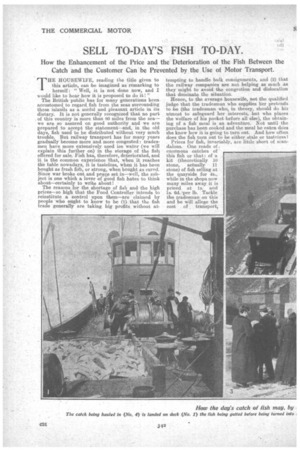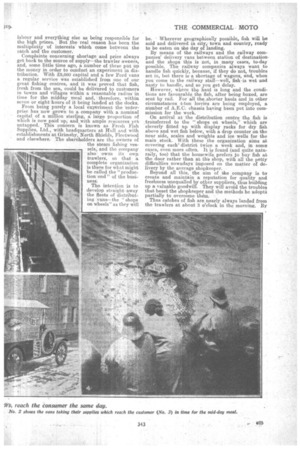SELL TO-DAY'S FISH TO-DAY.
Page 16

Page 17

Page 18

If you've noticed an error in this article please click here to report it so we can fix it.
How the Enhancement of the Price and the Deterioration of the Fish Between the Catch and the Customer Can be Prevented by the Use of Motor Transport.
THE HOUSEWIFE, reading the title given to this article, can be imagined as remarking to herself : "Well, it is not done now, and I would like to hear how it is proposed to do it!" The British public has for many generations been accustomed to regard fish from the seas surrounding these islanas as a useful and pleasant article in its dietary. It is not generally recognized that no part , of this country is more than 80 miles from the sea— we are so assured on good authority and we are prepared to accept the statement—and, in the old days, fish used to be distributed without very much trouble. But railway transport has for many years gradually become more and more congested: tradesmen have more extensively, used ice water (we will explain this further on) in the storage of the fish offered for sale. Fish has, therefore, deteriorated, and it is the common experience that, when it reaches the table nowadays, it is tasteless, when it has been bought as fresh fish, or strong, when bought as cured. Since war broke out and peace set in—well, the subject is one which a lover of good fish hates to think about—certainly to write about! The reasons for the shortage of fish and the high prices—so high that the Food Controller intends to reinstitute a control upon them—are claimed by people who ought to know to be (1) that the fish trade generally are taking big profits, without. at
tempting to handle bulk consignments, and (2) that the railway companies are not helping as much -as they might to avoid the congestion and dislocation that dominate the situation.
Hence, to the average housewife, not the qualified judge that the tradesman who supplies her pretends to she (the tradesman who, in theory, should do his utmost to safeguard her interests, but who places the welfare of his pocket before all else), the obtaining of a fish meal is an adventure. Not until the purchase has been cooked and the meal be eaten does she know how it is going to turn out. And how often does the fish turn out to be either stale or tasteless'?
Prices for fish, invariably, are little short of saandalous. One reads of .
enormous catches of
this fish or that: of a kit (theoretically 10 stone, actually 11 stone) of fish selling at the quayside for 4s., while in the shops now many miles away it is priced at is. and is. 6d. /per lb. Tackle the tradesman on this and he will allege the cost of transport,
labour and everything else as being responsible for the high prices. But the real reason has bees the multiplicity of interests which come between the catch and the customer.
Complaints concerning shortage and price always get back to the source of supply—the trawler owners, and, some little time ago, a number of these put Up the money in order to conduct an experiment in distribution. With £5,000 capital and a few Ford vans a regular service was established from one of our great fishing centres, and it was proved that fish, fresh from the sea, could be delivered to customers in towns and villages within a reasonable radius in time for the midday meal and, therefore within seven or eight hours of it being landed at the docks. From being purely a local exyreriment the enterprise has now grown to a company with a nominal capital of a million sterling, a large proportion of which is now paid up; and with ample resources yet untapped. This concern is known as Fresh Fish Supplies, Ltd., with headquarters at Hull and with establishments at Grimsby, North Shields, Fleetwood and elsewhere. The shareholders are the owners of the steam fishing vessels, and the company also owns its own trawlers, so that a complete organization is there for what might be called the "production end" of the business.
The intention is to develop straight-away the fleets of distributing vans—the "shops on wheels" as they will
be. Wherever geographically possible, fish will be sold and delivered in city; town and country, ready to be eaten on the day of landing. By means of the railways and the railway companies' delivery vans between station of destination, and the shops this is not, in many cases, to-day possible. The railway companies always want to handle fish quickly, because, if they do not, troubles set in, but there isa shortage of wagons, and, when you come to the railway staff—well, fish.is wet and nasty to handle, and BO you get delay. However, where the haul is long and the conditions are favourable the fish, after being boxed, are sent by rail. For all the, shorter hauls and in other circumstances 4-ton lorries are being employed, a number of A.E.C. chassis having been put into commission for the work.
On arrival at the distribution centre the fish is transferred to the "shops on wheels," which are cleverly fitted up with display racks for dry fish above and wet fish below, with a drop counter on the near side, scales and weights and ice wells for the main stock. With these the organization aims at covering each' district twice a week and, in some cases, even more often. It is found (and quite naturaily, too) that the housewife prefers .to buy fish at the door rather than at the shop, with. all the petty difficulties nowadays imposed on the matter of delivery by the average shopkeeper.
Beyond all this, the aim of the company is to create and maintain a reputation for quality and freshness unequalled by other suppliers, thus building up a valuable goodwill. They will-avoid the troubles that beset the shopkeeper and the methods he adopts partially to overcome them.
Thus catches of fish are nearly always landed from the trawlers at about 3 o'clock in the morning. BY
7.30 or 8 o'clock they can be en route either by rail or 4-ton lorry. Before 11 o'clock the fish can be distributed to the delivery vans, and by 12.30 it can all be sold to the customers. The shopkeeper is not able to ecure such expedition, and his deliveries cannot reach him till later in. the day or some time the next day. This fact elucidates the Great Haddock Mystery. The haddock reaches the shop, is not sold that day and goes in the ice-water box for the night. The next day it is again exposed for sale, receiving an occasional bath from the hose pipe so as to convey the impression that it has just been lifted from the sea. 'cow, fish on dry ice fides not come to any, harm, but when it is allowed to lie for hours in ice water it becomes soddened and loses vour, and the constant hosings all wash away some of the fish juices. Hence the tastelessness when sold as " fresh" fish. Assuming that our example haddock has not been sold, it has now begun to get stale, so the fishmonger "saves its life" by splitting and smoking it in the smoke house, 'which is attached for this very purpose to many: fish shops. Sothat smoking is, generally, the last stage in the life of the haddock, which, when it comes to be eaten, has that strong flavour which we all know, and which makes us wonder where all the fine
don haddeeks really go, As a matter of fact fish intended so to be treated should be cured within six hours of being landed, if it is to be worth eating.
The transport of fish calls for expert knowledge. Fish will travel long -distances if properly packed so that it will not thrash, with ice to keep it in condition and quite free from moisture. In boxes so packed fish can, without damage or injurg, be transported on solidtyred lorries. But when it is Lying loose, as in the delivery vans, it requires to be insulated from vibration. Hence the pneumatic tyre is the proper equipment for the vans. The company have already contracted for 'a number of vans and are now in the market for 200 chassis capable of a gross load of 23 cwt., or what may be described as a 15-20-cwt. vehicle. The maximum load of fish is 15 cwt., the body weighs from 4 to 5 cwt., and the driver and boy can be put at 3 cwt. And the question is now being put (we believe in the form of ' an advertisement in this issue of The Commercial Motor) to British motor inanufacturers as to whether theyican now deal with such -an order. We hope they can, because it is absurd to think that the order should have to go abroad.
The company will have its own garages and maintenance depots, and it is intended to group the vehicles of different makes in. different depots, so as to simplify the service question. The concern is all ready with its organization, even with its van bodies in the process of being built, and all that is required are the chassis. We hope that the response of the motor industry will be rapid, because the present
plans are devised so that theybe extended as rapidly as motor vans can be obained, and there are thousands of people who, so soon as they learn of the scheme, will be looking for the "shops on 'wheels" to come along their roads bringing them fish that only left the sea a few hours before.








































